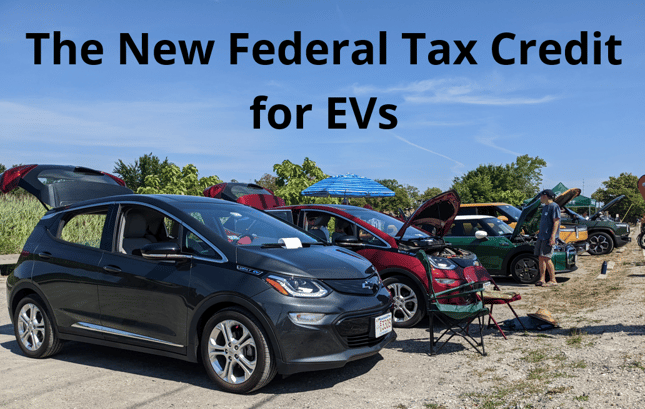Electric Cars That Qualify for Federal Tax Credit to Change on April 18
Back in January, we reported that the federal government was delaying the implementation of the complicated new...

President Biden signed the Inflation Reduction Act (IRA) into law on August 16, 2022. The IRA is a huge deal. It’s the largest climate bill ever passed within the US and touches on all the major cornerstones of the fight against climate change: electricity generation, heating, and transportation (among lots of other things). We’re had a webinar on August 30 to explain what the IRA means for consumers in Massachusetts and Rhode Island. However, we’re getting a lot of questions already on the changes to the federal tax credit for electric vehicles (EVs), and because these changes are impacting people in the market for an EV now, here is an explainer of what the federal tax credit will look like for the rest of this year AND what to expect from 2023.
Update from 2023: The roll-out of the new federal tax credit is happening in stages. To see the latest information, please see our Rebates & Incentives page.
Most of the changes to the federal tax credit for EVs in the IRA go into effect on January 1, 2023; however, as of the signing of the Inflation Reduction Act, one new requirement kicks in immediately. To qualify for the federal tax credit (now called the Clean Vehicle Credit) today, a vehicle’s final assembly location must be in North America. This provision immediately reduces the number of vehicles that are eligible for the federal tax credit.
The following vehicles are eligible for the federal tax credit from August 16, 2022, to December 31, 2022. They meet the two requirements that (1) their manufacturer had not yet reached the 200,000 cap of the old federal tax credit system, and (2) they are assembled in North America according to the Department of Energy’s Alternative Fuels Data Center (AFDC). You can visit our Drive Green form to find out how much each vehicle is eligible for through the end of 2022.
| Audi Q5 | BMW 3-series Plug-In | BMW x5 | Chrysler Pacifica PHEV |
| Ford Escape PHEV | Ford F-150 Lightning | Ford Mustang Mach-E | Ford Transit Van |
| Jeep Grand Cherokee PHEV | Jeep Wrangler PHEV | Lincoln Aviator PHEV | Lincoln Corsair Plug-in |
| Lucid Air | Nissan LEAF | Rivian R1S and R1T | Volvo S60 |
A big caveat: the AFDC directs you to a VIN (vehicle identification number) decoder that allows you to determine whether the particular vehicle you’re looking at was in fact assembled at a plant in North America. Instructions on how to do that live here.
 The Rivian R1T at a recent electric vehicle showcase event - with an e-bike in the truckbed!
The Rivian R1T at a recent electric vehicle showcase event - with an e-bike in the truckbed!
The Inflation Reduction Act fundamentally changed the structure of the federal tax credit. The following changes go into effect on or after January 1, 2023.
As of January 1, 2023, the 200,000-unit cap that has removed the federal tax credit for Tesla and General Motors will be lifted.
As of January 1, 2023, to qualify for the clean vehicle credit, a consumer has to meet income requirements: joint filers must make less than $300,000 to qualify; individuals must make less than $150,000.
The requirement that final assembly must take place in North America that has already kicked in continues into 2023 and beyond. In addition, the following provisions kick in on January 1, 2023.
Very excitingly, the Clean Vehicle Credit is now available for used vehicles too! The used vehicle credit will amount to $4,000 or 30% of the vehicle’s cost, whichever is less and apply to vehicles costing less than $25,000. Income caps for used car purchases are lower: $150,000 for joint filers and $75,000 for single filers.
Starting in 2024, consumers will be able to transfer the value of the clean vehicle credit to the car dealership so that they can take advantage of the incentive at the point of sale. Details on exactly how this will work are still TBD!
We’ll talk about all of these changes at length at our August 30 webinar and will be sure to write future blog posts on the topic. Though the income and pricing provisions are pretty straightforward, it’s not clear yet which current and upcoming EV models will meet the battery sourcing requirements in the IRA. Though it’s too soon to say which vehicles will be eligible for the federal tax credit starting January 1, 2023, we already know some vehicles will NOT be eligible for one of two reasons.
The following vehicles are not eligible for the federal tax credit as of the signing of the IRA – and will continue to not be eligible starting January 1, 2023 – because their final assembly does not take place in North America. (If manufacturers shift production to North America, this list may change). This list is courtesy of Consumer Reports.
| Audi E-Tron | Fisker Ocean | Genesis GV60 | Hyundai Ioniq 5 |
| Hyundai Ioniq 6 | Hyundai Kona Electric | Hyundai Nexo | Jaguar I-Pace |
| Kia EV6 | Kia Niro Electric | Lexus RZ | Mazda MX-30 |
| Mercedes-Benz EQB | Nissan Ariya | Polestar 2 | Subaru Solterra |
| Toyota bZ4x | Toyota Mirai | Volkwagen ID.4 (certain models) | Volvo C40 |
Meanwhile, the following vehicles will not be eligible for the federal tax credit as of January 1, 2023, because their cost is over the price limit. (List also courtesy of Consumer Reports.) Some of them are currently eligible, others aren’t. Vehicles in green are currently eligible, vehicles in red are already ineligible, and vehicles in orange are currently ineligible but may (at least partially) become eligible again.
|
Vehicle |
Notes |
|
Audi E-Tron GT |
Already ineligible because of assembly location. |
|
BMW i4 |
Not on the list of currently eligible vehicles from AFDC. |
|
BMW i7 |
Not on the list of currently eligible vehicles from AFDC. |
|
BMW iX |
Not on the list of currently eligible vehicles from AFDC. |
|
Chevrolet Silverado EV |
Currently ineligible because General Motors hit the 200,000-unit cap. However, those models that are under $80,000 will be eligible starting in 2023. |
|
Ford F-150 Lightning |
Currently eligible. Starting in 2023, only models that are under $80,000 will be eligible. |
|
Genesis G80 Electric |
Not on the list of currently eligible vehicles from AFDC. |
|
GMC Hummer EV |
Already ineligible because General Motors hit the 200,000-unit cap. |
|
Lucid Air |
Currently eligible. |
|
Mercedes-Benz EQE |
Not on the list of currently eligible vehicles from AFDC. |
|
Mercedes-Benz EQS |
Not on the list of currently eligible vehicles from AFDC. |
|
Porsche Taycan |
Not on the list of currently eligible vehicles from AFDC. |
|
Rivian R1T |
Currently eligible. Starting in 2023, only models that are under $80,000 will be eligible. |
|
Tesla Cybertruck |
Currently ineligible because Tesla hit the 200,000-unit cap. However, those models that are under $80,000 will be eligible starting in 2023. |
|
Tesla Model S |
Already ineligible because Tesla hit the 200,000-unit cap. |
|
Tesla Model X |
Already ineligible because Tesla hit the 200,000-unit cap. |
Seriously, this is really confusing. The Boston Globe and WBUR agree. We hope this blog has helped at least a little bit. To learn more, we recommend:
Let us know what your questions are!
Good question! Rhode Island has a newly instated rebate for EVs that you can learn about here. The climate bill Governor Baker recently signed in Massachusetts makes several excellent changes to the state rebate program. Unfortunately, we don’t yet have a timeline from the MOR-EV program on when those changes will be live. We will keep you posted!
Back in January, we reported that the federal government was delaying the implementation of the complicated new...
Last week, the Internal Revenue Service (IRS) and Treasury Department made a change to the federal tax credit for...
Comments